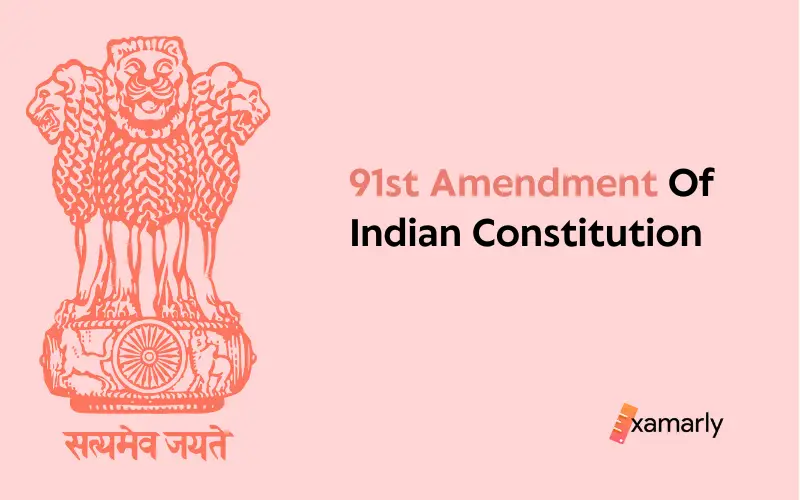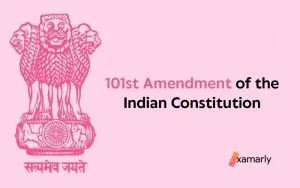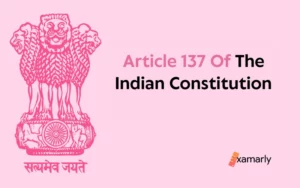91st Amendment of Indian Constitution focused on limiting the size of the Council of Ministers and making the Anti defection laws stronger.
This article will provide a detailed analysis of the Amendment, its salient features, the need for the Amendment, insertions of new articles and a brief explanation of the exemption from disqualification clause under the Tenth schedule. Let’s find out.
The 91st Amendment Of Indian Constitution
The 91st Amendment of Indian Constitution was introduced to restrict the size of the Council of Ministers to 15% because by limiting the proportion of the Council, the enormous expenditure by the Jumbo Cabinet could be limited.
Moreover, the 52nd Amendment of the Indian Constitution had some major loopholes; it allowed the dispersion of ministers from one party to another, thus causing instability. To rectify this flaw, 91st Amendment was proposed, which amended many articles and inserted new ones.
The size of the Central Council was limited to not more than 15% of the Lok Sabha, including the Prime Minister, in accordance with the 91st Amendment to the Indian Constitution, and the size of the State Council was limited to not more than 15% of the state Legislative Assembly, including the Chief Minister.
Also, if any member of either House of Parliament is found guilty of the defection, they are subjected to undergo termination of their post until their remaining tenure or until fresh elections are conducted. Such members are also unlikely to hold any remunerative posts and are banned from serving as ministers.
The 91st Amendment also witnessed the removal of a clause from the Tenth Schedule that offered an exemption from disqualification in the case of a split by one-third of the legislature.
Salient Features And Facts
The 91st Amendment witnesses many insertions of clauses by amending several articles. The salient features and facts of the 91st Amendment act are as follows-
- The 91st Amendment Act is likely to be called the Constitution (Ninety-first Amendment) Act, 2003.
- Amendment of Article 75 with insertion of clauses 1A and 1B to it.
- Article 164 also underwent modification and clauses 1A and 1B were introduced.
- The addition of new article 361B also took place.
Date Enacted
The Lok Sabha and the Rajya Sabha passed the bill in December 2003, and in January 2004, the bill got approved by the President and became an Act.
Statement Of Objects And Reasons
- The need for the 91st Amendment rose due to flaws in the 52nd Amendment (Anti-Defection laws) of the Indian Constitution.
- The tenth schedule under the 52nd Amendment could not limit the defections since it allowed the dispersion of 1/3rd members from one political party to another. In simple words, if 1/3rd of members of one party decided to go to another party, then no anti-defection laws would apply to them.
- Such defections caused instability in the parties since anyone could change their allegiance at any time, thus disrupting the proper functioning of the bodies.
- According to reports from Dinesh Goswami Committee and NCRWC, paragraph 3 of the tenth schedule does not allow disqualification of defected individuals in-case they split, and they suggested removing the clause.
- Also, NRCWC came up with another suggestion that the defections should be treated with penalization such that they are exempted to hold any minister’s position or remunerative political post until their term of legislature remains or until the next elections take place, whichever takes place early.
- The NCRWC also suggested that the maximum number of Ministers in a State or the Union Government be set at 10% of the total strength of the popular House of the Legislature.
This was pointed out due to the abnormally large Council of Ministers that was being formed by the Government at the Centre and state levels and such practices need to be stopped. - Given the above statements, it was proposed that the the the Council of Minister’s size be set to 10% of the total strength of the relevant house. However, smaller states like Goa, Sikkim and Mizoram can have a minimum strength of seven ministers.
Thus, the 91st Amendment Act gave a proposal that limited the members of the Council of Ministers to not more than 15% of the total Lok Sabha membership. Many provisions per the 91st Amendment Act are discussed in this article.
See Also – 88th Amendment Of Indian Constitution
Prominent People Involved
Although these people are not directly involved in bringing the 91st Amendment, they played an important role by pointing out the flaws in the 52nd Amendment.
The 91st Amendment was established because of the report submitted by Dinesh Goswami against the 52nd Amendment.
The involvement of NCRWC also strengthened the 91st Amendment and made changes to the tenth schedule.
The Law Commission was also involved in refining the 52nd Amendment and thus coming up with the 91st Amendment.
The 91st Amendment was proposed under the committee directed by the late Mr. Pranab Mukherjee.
Important Provisions
The 91st Amendment of the Indian Constitution observed several provisions as discussed below-
- Addition of clause 1A to Article 75. The clause states that all the representatives of the Central Council of Ministers along with the Prime Minister shall not surpass 15% of overall members of the Lok Sabha, and
clause 1B states that if any minister due to defections from either House is debarred from holding the minister’s position in that particular house, they are also banned to serve as a minister. - Addition of clause 1A to Article 164. The clause states that the combined number of members along with the Chief Minister in a state council of Ministers shall not exceed 15% of the overall members of that state’s Legislative Assembly, and a state must have a minimum of 12 ministers overall, including the chief minister while
clause 1B states any political party member of either House of a state legislature who is disqualified from serving based on defection is likewise disqualified from serving as a minister. - Insertion of new Article 361B. The article states that any member of any political party who has been disqualified from serving in either the House of Parliament or the House of Legislature due to defection charges is also subjected to be banned from being in any paid political post.
- The provision to delete the anti-defection clause of the tenth schedule was also made in the 91st Amendment. The tenth schedule allowed the splitting of 1/3rd of members from one party to another.
Summing Up
The 91st Amendment of the Indian Constitution witnessed many changes. Firstly, the size of the Council was reduced to 15% of the Lok Sabha and the State Legislative Assembly. Such control on the proportion was necessary to cut off the massive expenditure by the Jumbo Cabinets.
Secondly, the insertion of clauses 1A and 1B to both Articles 75 and 164 were observed. These insertions claim that disqualification of any member from their houses on the grounds of defection will lead to barring them from serving as a minister until the next elections or the termination of their tenure, whichever is earlier.
The Amendment also added Article 361B which does not allow any member of either House of Parliament or the House of Legislature to hold the paid position if they have been charged with defection.
Finally, it permits the dropping of the Anti-defection clause that permitted the defection of 1/3rd of members.
FAQ’s
When was the 91st Amendment Act introduced?
The 91st Amendment bill was passed in December 2003 and was notified on January 2, 2004, in the Indian Gazette.
What changes are introduced in the 91st Amendment of the Indian Constitution?
There was the insertion of clauses 1A and 1B in articles 75 and 164.
A new article was added – Article 361B.
A clause that allowed the defection of 1/3rd members under the tenth schedule was deleted.
What is the size of the Council of Ministers according to the 91st Amendment?
The size of the Central and the State Council of Ministers including the Prime Minister and the Chief Minister is restricted to 15% of the total members in Lok Sabha and State Legislative Assembly.
What would happen if any member follows defection?
According to the 91st Amendment of the Indian Constitution, if any member changes party, they are banned from holding any political and paid position.






